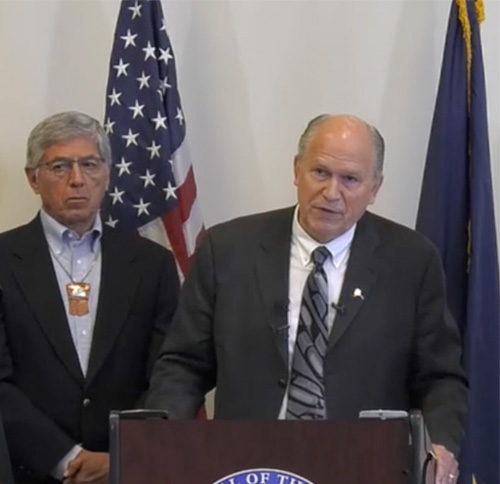
Governor Walker Vetoes $1.29 Billion to Preserve State SavingsFinance Co-Chairs concerned vetoes will harm Alaska’s economyBy MARY KAUFFMAN
June 29, 2016
In additon to the $1.29 billion in unrestricted general fund cut vetoes, Governor Walker ordered a stop to $250 million of spending on transportation projects which included pausing the Kake-Petersburg Road project in Southeast Alaska. Other vetoes reduced government, education & University of Alaska funding by an additional $190 million. With a partial veto, the Governor also reduced the $1.362 billion permanent fund dividend appropriation by $666.4 million. The reduced fund amount of $695.6 million will maintain a maximum of $1,000 per person in future PFD distributions. Since the Alaska legislature passed the budgets for fiscal year 2016 and fiscal year 2017 without any way to pay for them, the Governor said he used his veto authority to protect the state’s primary savings.
Governor Walker (I), joined by Lt. Governor Byron Mallott (D), announces his vetoes at a press availability Wednesday morning. Video capture photo.
These are some of Governor Walker’s line-item veto actions:
“Not a single one of these decisions was made lightly,” Governor Walker said. “I especially struggled with the funding to education, which I have consistently prioritized. But a $4 billion deficit means nothing can be insulated. What’s disappointing is this was completely avoidable. My team and I introduced a balanced plan in December that fairly distributed the burden across all demographics. Not a single measure of that plan was passed by the legislature, nor was another plan even introduced. I thank members of the Senate for having made the fiscally responsible decision to pass the Permanent Fund Protection Act—a vote some House members refused to even take.” During the 149 days legislators were in regular, extended and special sessions, the legislature reduced $400 million, solving 10 percent of the problem and leaving 90 percent of the work undone according a news release by the Office of the Governor. Legislators’ top reasons for failing to pass the Permanent Fund Protection Act, the cornerstone of the New Sustainable Alaska Plan, were that a) state spending had not been cut enough; b) credits to oil companies needed to be reduced; or c) legislators did not want to take the political heat for reducing the PFD amount. “I’ve now done that work; I’ve taken all their excuses off the table, so I urge legislators to come back and finish Alaska’s work,” Governor Walker said. “Alaskans, please ask your representatives and senators to do what is best for Alaska’s future; not what is best for their own political futures.” Alaska Senator Anna MacKinnon (R-District G) responded to the news saying the Governor Walker has once again delayed paying tax credits that were legally accrued by companies working in Alaska. "Once again the Governor has taken the easy way out and cast a cloud over new investment. In yesterday's press conference the Governor remarked that our pipeline was "3/4 empty", said MacKinnon. "Today he is dis-incentivizing the new discovery and production Alaska desperately needs. The tax credits earned since the Governor took office are the State's legal obligation. Delaying them is like throwing away a credit card bill. Putting off payment won't make it go away, it just hurts Alaska's credit with the very investors we need to help re-fill the pipeline." said Senator MacKinnon. The veto includes $430 million in tax credit and other payments to the oil and gas industry down to the statutory minimum requirement of $30 million. The veto of the oil tax credit money is supported by members of the Alaska Independent Democratic Coalition (AIDC) in the Alaska House of Representatives according to an AIDC news release. “Our budget is being burdened by this unsustainable system of tax credits that results in the State of Alaska covering hundreds of millions in losses incurred by oil and gas companies, many of which are among the richest corporations on earth,” said AIDC Leader Rep. Chris Tuck (D-Anchorage). “Legislative efforts to fix this system only got part way there this year. That forced the Governor to make the bold decision to use his veto power to make sure our budget is not overwhelmed by subsidy payments to the oil industry.” Alaska House Finance Co-Chairs Mark Neuman and Steve Thompson also released statements after the announced budget vetoes for the FY17 Statewide Operating Budget, House Bill 256, and the FY17 Capital Budget, Senate Bill 138. Earlier this month, the Alaska Legislature narrowly approved House Bill 247, which the Governor signed today. The bill partially fixes some of the flaws in the system of providing tax credits to the oil and gas industry, but the members of the Alaska Independent Democratic Coalition opposed the bill because it continues unsustainable subsidies that will cost Alaska hundreds of millions of dollars a year, especially if oil prices remain low. Specifically, HB 247 did not address the unsustainable credit system on the North Slope that results in the State covering 35 percent of oil company losses, even if they pay little or no production tax. “Paying out more in tax credits than we receive in production taxes doesn’t make sense and is just bad business. I want to thank Governor Walker for his leadership and courage in using his veto pen as a short-term solution,” said Rep. Dan Ortiz (I-Ketchikan). “I remain hopeful that a long-term solution can be achieved that will allow us to deal with this flawed system once and for all.” In addition to the veto of $430 million in oil tax credit payments, Governor Walker is pausing eight state funded highway projects across the state including the overly expensive U-Med District Northern Access Road project. Additionally, the Governor is halting the Knick Arm Bridge and Susitna-Watana Dam megaprojects projects, a decision which the Alaska Independent Democratic Coalition has long supported. The Kake-Petersburg Road project in Southeast Alaska is also among the eight state funded highway projects paused. Some of the other items vetoed by the Governor, including a $6.4 million cut to the K-12 base student allocation and a $10 million cut to the University of Alaska, are concerning to the members of the Alaska Independent Democratic Coalition because much of that funding was restored as part of the budget deal agreed to during the Fourth Special Session that wrapped up earlier this month. The largest line item budget veto announced today was a cut of $666.4 million to upcoming Permanent Fund Dividend (PFD) payments. If this cut remains unchanged, the 2017 PFD payment will be capped at $1,000 instead of the anticipated $2,000 based on the traditional calculations of Permanent Fund earnings. “The Governor is playing politics with the budget to get a Permanent Fund restructuring vote. Calling us back into a historic Fifth Special Session won’t change legislator’s minds,” said Rep. Tuck. “We work for the people of Alaska, not for the Governor.” While some of the Governor’s cuts are alarming, the members of the Alaska Independent Democratic Coalition stated in a news release they remain committed to the goal they share with Governor Walker to preserve Alaska’s dwindling savings and spur the Alaska Legislature to pass a comprehensive and fair fiscal plan. Governor Walker has already called a fifth special session to address his plan to restructure the Permanent Fund and the current oil and gas tax system. The session will convene on July 11, 2016 in Juneau. The Alaska Legislature will have the opportunity to override any of the budget vetoes during the special session.
On the Web:
Source of News:
Representations of fact and opinions in comments posted below are solely those of the individual posters and do not represent the opinions of Sitnews.
|
|||






